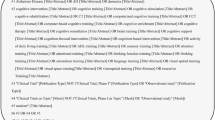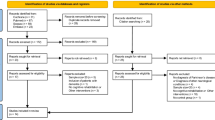Abstract
Purpose of Review
To critically review recent research in the development of non-pharmacological interventions to improve cognitive functioning in individuals with Alzheimer’s disease (AD) or Parkinson’s disease (PD).
Recent Findings
Cognitive interventions can be grouped into three categories: cognitive stimulation (CS), cognitive training (CT), and cognitive rehabilitation (CR). CS confers temporary, nonspecific benefits and might slightly reduce dementia risk for neurologically healthy individuals. CT can improve discrete cognitive functions, but durability is limited and real-world utility is unclear. CR treatments are holistic and flexible and, therefore, most promising but are difficult to simulate and study under rigorous experimental conditions.
Summary
Optimally effective CR is unlikely to be found in a single approach or treatment paradigm. Clinicians must be competent in a variety of interventions and select those interventions best tolerated by the patient and most relevant to their needs and goals. The progressive nature of neurodegenerative disease necessitates that treatment be consistent, open-ended in duration, and sufficiently dynamic to meet the patient’s changing needs as their disease progresses.
Similar content being viewed by others
References
Papers of particular interest, published recently, have been highlighted as: • Of importance •• Of major importance
World Alzheimer report. attitudes to dementia Alzheimer’s Disease International. London. 2019;2019:1–160.
Guo J, Wang Z, Liu R, Huang Y, Zhang N, Zhang R. Memantine, donepezil, or combination therapy – what is the best therapy for Alzheimer’s disease? A network meta-analysis. Brain Behav. 2020;10(11):1–13. https://doi.org/10.1002/brb3.1831.
Salomone S, Caraci F, Leggio GM, Fedotova J, Drago F. New pharmacological strategies for treatment of Alzheimer’s disease: focus on disease modifying drugs. Br J Clin Pharmacol. 2012;73(4):504–17.
Walsh S, Merrick R, Milne R, Brayne C. Aducanumab for Alzheimer’s disease? BMJ. 2021;374:1–2.
van Dyck CH, Swanson CJ, Aisen P, Bateman RJ, Chen C, Gee M, et al. Lecanemab in early Alzheimer’s disease. N Engl J Med. 2023;388(1):9–21.
Voelbel GT, Lindsey HM, Mercuri G, Bushnik T, Rath J. The effects of neuroplasticity-based auditory information processing remediation in adults with chronic traumatic brain injury. NeuroRehabilitation. 2021;49(2):267–78.
Cicerone KD, Goldin Y, Ganci K, Rosenbaum A, Wethe JV, Langenbahn DM, et al. Evidence-based cognitive rehabilitation: systematic review of the literature from 2009 through 2014. Arch Phys Med Rehabil. 2019;100(8):1515–33.
Krellman JW, Tsaousides T, Gordon WA. Neuropsychological interventions following traumatic brain injury. In: Ashley MJ, Hovda DA, editors. Traumatic brain injury rehabilitation, treatment, and case management. Boca Raton (FL): CRC Press; 2017. p. 393–410.
Contreras-Somoza LM, Irazoki E, Toribio-Guzmán JM, de la Torre-Díez I, Diaz-Baquero AA, Parra-Vidales E, et al. Usability and user experience of cognitive intervention technologies for elderly people with MCI or dementia: a systematic review. Front Psychol. 2021;12:1–15.
Germain S, Wojtasik V, Lekeu F, Quittre A, Olivier C, Godichard V, et al. Efficacy of cognitive rehabilitation in Alzheimer disease: a 1-year follow-up study. J Geriatr Psychiatry Neurol. 2019;32(1):16–23.
Zucchella C, Sinforiani E, Tamburin S, Federico A, Mantovani E, Bernini S, et al. The multidisciplinary approach to Alzheimer’s disease and dementia. A narrative review of non-pharmacological treatment. Front Neurol. 2018;9:1–22.
Miller KJ, Geirland J, Gomez ME, Dye RC, Ercoli LM. Memory training and aging. In: Lavretsky H, Sajatovic C, Reynolds C, editors. Complementary and integrative therapies for mental health and aging. New York (NY): Oxford University Press; 2016. p. 321–40.
Bahar-Fuchs A, Clare L, Woods B. Cognitive training and cognitive rehabilitation for persons with mild to moderate dementia of the Alzheimer’s or vascular type: a review. Alzheimer’s Res Ther. 2013;5:1–14.
Xu H, Yang R, Qi X, Dintica C, Song R, Bennett DA, et al. Association of lifespan cognitive reserve indicator with dementia risk in the presence of brain pathologies. JAMA Neurol. 2019;76(10):1184–91.
Stern Y. Cognitive reserve. Neuropsychologia. 2009;47(10):2015–28.
Fonte C, Smania N, Pedrinolla A, Munari D, Gandolfi M, Picelli A, et al. Comparison between physical and cognitive treatment in patients with MIC and Alzheimer’s disease. Aging (Albany NY). 2019;11(10):3138–55. Representative RCT of a multifaceted cognitive rehabilitation program.
Tennstedt SL, Unverzagt FW. The ACTIVE study: study overview and major findings. J Aging Health. 2013;25(8S):3S-20S.
Sohlberg MM, Avery J, Kennedy M, Ylvisaker M, Coelho C, Turkstra L, et al. Practice guidelines for direct attention training. J Med Speech Lang Pathol. 2003;11(3):19–39.
Kim H, Lee J, Chang SM, Kim BS. Effects of a cognitive rehabilitation program based on mnemonic skills and memory compensatory strategies for older adults: a pilot study. Medicine. 2022;101(31):1–7.
Luo Y, Lin R, Yan Y, Su J, Lin S, Ma M, et al. Effects of remote expressive arts program in older adults with mild cognitive impairment: a randomized controlled trial. J Alzheimers Dis. 2023;91(2):815–31.
Duff K, Ying J, Suhrie KR, Dalley BC, Atkinson TJ, Porter SM, et al. Computerized cognitive training in amnestic mild cognitive impairment: a randomized clinical trial. J Geriatr Psychiatry Neurol. 2022;35(3):400–9.
Gavelin HM, Domellöf ME, Leung I, Neely AS, Launder NH, Nategh L, et al. Computerized cognitive training in Parkinson’s disease: a systematic review and meta-analysis. Ageing Res Rev. 2022;80:1–10. Comprehensive review of computerized cognitive training tools in Parkinson’s disease.
Lasaponara S, Marson F, Doricchi F, Cavallo M. A scoping review of cognitive training in neurodegenerative diseases via computerized and virtual reality tools: what we know so far. Brain Sci. 2021;11(5):1–29. Comprehensive review of computerized cognitive training tools in neurodegenerative disease.
Li BY, He NY, Qiao Y, Xu HM, Lu YZ, Cui PJ, et al. Computerized cognitive training for Chinese mild cognitive impairment patients: a neuropsychological and fMRI study. NeuroImage Clin. 2019;22:1–8.
Cavallo M, Hunter EM, van der Hiele K, Angilletta C. Computerized structured cognitive training in patients affected by early-stage Alzheimer’s disease is feasible and effective: a randomized controlled study. Arch Clin Neuropsychol. 2016;31(8):868–76.
Cavallo M, Angilletta C. Long-lasting neuropsychological effects of a computerized cognitive training in patients affected by early stage Alzheimer’s disease: are they stable over time? J Appl Gerontol. 2019;38(7):1035–44.
van Balkom TD, Berendse HW, van der Werf YD, Twisk JW, Peeters CF, Hoogendoorn AW, et al. Effect of eight-week online cognitive training in Parkinson’s disease: a double-blind, randomized, controlled trial. Parkinsonism Relat Disord. 2022;96:80–7.
Leung IH, Walton CC, Hallock H, Lewis SJ, Valenzuela M, Lampit A. Cognitive training in Parkinson disease: a systematic review and meta-analysis. Neurol. 2015;85(21):1843–51.
Orgeta V, McDonald KR, Poliakoff E, Hindle JV, Clare L, Leroi I. Cognitive training interventions for dementia and mild cognitive impairment in Parkinson’s disease. Cochrane Database Syst Rev. 2020;2:1–63. Comprehensive review of cognitive training in Parkinson’s disease.
Katz B, Shah P, Meyer DE. How to play 20 questions with nature and lose: reflections on 100 years of brain-training research. Proc Natl Acad Sci U S A. 2018;115(40):9897–904.
Redick TS, Shipstead Z, Harrison TL, Hicks KL, Fried DE, Hambrick DZ, et al. No evidence of intelligence improvement after working memory training: a randomized, placebo-controlled study. J Exp Psychol Gen. 2013;142(2):359–79.
Owen AM, Hampshire A, Grahn JA, Stenton R, Dajani S, Burns AS, et al. Putting brain training to the test. Nat. 2010;465(7299):775–8.
Zhang H, Huntley J, Bhome R, Holmes B, Cahill J, Gould RL, et al. Effect of computerised cognitive training on cognitive outcomes in mild cognitive impairment: a systematic review and meta-analysis. BMJ. 2019;9(8):1–10.
Kim H, Jung J, Lee S. Therapeutic application of virtual reality in the rehabilitation of mild cognitive impairment: a systematic review and meta-analysis. Vision. 2022;6(4):1–10.
Yu D, Li X, Lai FH. The effect of virtual reality on executive function in older adults with mild cognitive impairment: a systematic review and meta-analysis. Aging Ment Health. 2023;27(4):663–73.
White PJ, Moussavi Z. Neurocognitive treatment for a patient with Alzheimer’s disease using a virtual reality navigational environment. J Exp Neurosci. 2016;10:129–35.
Foloppe DA, Richard P, Yamaguchi T, Etcharry-Bouyx F, Allain P. The potential of virtual reality-based training to enhance the functional autonomy of Alzheimer’s disease patients in cooking activities: a single case study. Neuropsychol Rehabil. 2018;28(5):709–33.
Park JH. Does the virtual shopping training improve executive function and instrumental activities of daily living of patients with mild cognitive impairment? Asian J Psychiatry. 2022;69:102977.
Son C, Park JH. Ecological effects of VR-based cognitive training on ADL and IADL in MCI and AD patients: a systematic review and meta-analysis. Int J Environ Res Public Health. 2022;19(23):1–10. Comprehensive systematic review and meta-analysis examining training in daily living skills for individuals with Alzheimer’s disease.
Clay F, Howett D, FitzGerald J, Fletcher P, Chan D, Price A. Use of immersive virtual reality in the assessment and treatment of Alzheimer’s disease: a systematic review. J Alzheimers Dis. 2020;75(1):23–43.
Zhong D, Chen L, Feng Y, Song R, Huang L, Liu J, et al. Effects of virtual reality cognitive training in individuals with mild cognitive impairment: a systematic review and meta-analysis. Int J Geriatr Psychiatry. 2021;36(12):1829–47. Comprehensive systematic review and meta-analysis of virtual reality-based cognitive training for individuals with mild cognitive impairment.
Cheng TC, Huang SF, Wu SY, Lin FG, Lin WS, Tsai PY. Integration of virtual reality into transcranial magnetic stimulation improves cognitive function in patients with Parkinson’s disease with cognitive impairment: a proof-of-concept study. J Parkinson’s Dis. 2022;12(2):723–36.
Levy SA, Smith G, De Wit L, DeFeis B, Ying G, Amofa P, et al. Behavioral interventions in mild cognitive impairment (MCI): lessons from a multicomponent program. Neurotherapeutics. 2022;19(1):117–31.
Straubmeier M, Behrndt EM, Seidl H, Özbe D, Luttenberger K, Graessel E. Non-pharmacological treatment in people with cognitive impairment: results from the randomized controlled German day care study. Dtsch Arztebl Int. 2017;114(48):815–21.
Graessel E, Stemmer R, Eichenseer B, Pickel S, Donath C, Kornhuber J, et al. Non-pharmacological, multicomponent group therapy in patients with degenerative dementia: a 12-month randomized, controlled trial. BMC Med. 2011;9(1):1–11.
Li B, Tang H, He G, Jin Z, He Y, Huang P, et al. Tai chi enhances cognitive training effects on delaying cognitive decline in mild cognitive impairment. Alzheimers Dement. 2023;19(1):136–49.
Liu X, Wang G, Cao Y. Association of nonpharmacological interventions for cognitive function in older adults with mild cognitive impairment: a systematic review and network meta-analysis. Aging Clin Exp Res. 2023;35:463–78.
Yang C, Moore A, Mpofu E, Dorstyn D, Li Q, Yin C. Effectiveness of combined cognitive and physical interventions to enhance functioning in older adults with mild cognitive impairment: a systematic review of randomized controlled trials. Gerontologist. 2020;60(8):e633–42.
Lin M, Ma C, Zhu J, Gao J, Huang L, Huang J, et al. Effects of exercise interventions on executive function in old adults with mild cognitive impairment: a systematic review and meta-analysis of randomized controlled trials. Ageing Res Rev. 2022;82:1–14.
Wang R, Zhang H, Li H, Ren H, Sun T, Xu L, et al. The influence of exercise interventions on cognitive functions in patients with amnestic mild cognitive impairment: a systematic review and meta-analysis. Front Public Health. 2022;10:1–15.
Shao Z, Hu M, Zhang D, Zeng X, Shu X, Wu X, et al. Dose-response relationship in non-pharmacological interventions for individuals with mild cognitive impairment: a systematic review and meta-analysis of randomised controlled trials. J Clin Nurs. 2022;31(23–24):3390–401.
Prigatano GP. A history of cognitive rehabilitation. In: Halligan PW, Wade DT, editors. The effectiveness of rehabilitation for cognitive deficits. USA: Oxford University Press; 2005. p. 3–10.
Marks S. Psychotherapy in historical perspective. Hist Hum Sci. 2017;30(2):3–16.
Pettman E. A history of manipulative therapy. J Man Manip Ther. 2007;15(3):165–74.
Author information
Authors and Affiliations
Corresponding author
Ethics declarations
Conflict of Interest
The authors declare that they have no conflict of interest.
Human and Animal Rights and Informed Consent.
This article does not contain any studies with human or animal subjects performed by any of the authors.
Additional information
Publisher's Note
Springer Nature remains neutral with regard to jurisdictional claims in published maps and institutional affiliations.
Rights and permissions
Springer Nature or its licensor (e.g. a society or other partner) holds exclusive rights to this article under a publishing agreement with the author(s) or other rightsholder(s); author self-archiving of the accepted manuscript version of this article is solely governed by the terms of such publishing agreement and applicable law.
About this article
Cite this article
Krellman, J.W., Mercuri, G. Cognitive Interventions for Neurodegenerative Disease. Curr Neurol Neurosci Rep 23, 461–468 (2023). https://doi.org/10.1007/s11910-023-01283-1
Accepted:
Published:
Issue Date:
DOI: https://doi.org/10.1007/s11910-023-01283-1




